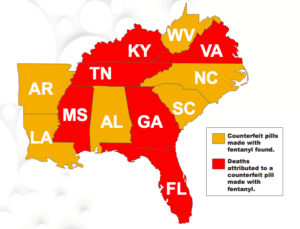South Carolina Man Produced Counterfeit Prescription Pills with Pill Presses and Imported Fentanyl
Greenville News reported on details from a pretrial bond hearing that shed new light on a counterfeit pills case working its way through federal court in South Carolina. According to the U.S. Department of Justice (DOJ), Eric Hughes was one of three men indicted in 2017 on five counts for allegedly conspiring to distribute U-47700, to distribute alprazolam, renting properties to use as a location for the manufacture of counterfeit pills, and manufacturing a controlled substance with reckless disregard for human life.
It was Richland County Sheriff’s deputy William Cobia whose testimony gave the public some insight into what had been a successful drug trafficking ring. It is alleged that since at least 2012, Hughes was the leader of the ring that manufactured and sold an unknown quantity of counterfeit Xanax and oxycodone pills online. “People actually sought out his site from across the country,” Cobia testified. “He made hundreds of thousands of pills, if not millions.”
The investigation into Hughes’ operation began after the Federal Bureau of Investigation notified law enforcement in South Carolina that Hughes had ordered a pill press, an essential piece of equipment in the manufacturing of counterfeit pills. Cobia testified that Hughes would order the chemical ingredients from a manufacturer in China in increments of at least nine pounds at a time and that he used those ingredients to make his fake pills. Cobia warned that because the pills were homemade, some of the pills could contain dangerous concentrations of the chemical ingredients. “They can potentially kill you,” he testified. “There’s no way to know what’s in those pills.”
Hughes, along with his two co-defendants, rented vacations homes in South Carolina and one in Georgia. “They set up their pill press in those homes,” essentially turning the properties into “clandestine drug laboratories,” Cobia said. “When they were done processing, the house would be totally contaminated.” It cost the owners of a house that the trio rented on Tybee Island, Georgia over $200,000 to have the place decontaminated. The owners of six other rental properties received warning letters from the U.S. Drug Enforcement Administration (DEA).
It was a DEA-led task force that arrested Hughes in August 2017. He had a car accident, and thousands of pills spilled onto the road. In speaking with the judge, Assistant U.S. Attorney Jim May said, “God only knows what was in those drugs he was producing. His drugs went out to unsuspecting populations, and he put peoples’ lives at risk.” The judge perceived Hughes to be a flight risk, and he was denied bond. If convicted, Hughes could spend up to 15 years in prison.
